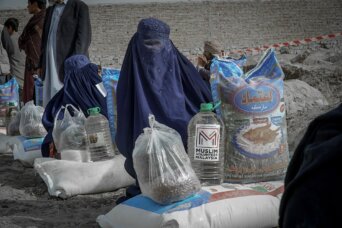- About
- Topics
- Picks
- Audio
- Story
- In-Depth
- Opinion
- News
- Donate
-
Signup for our newsletterOur Editors' Best Picks.Send
Read, Debate: Engage.

| topic: | Food Security |
|---|---|
| located: | Afghanistan |
| editor: | Shadi Khan Saif |
The mass starvation of millions of Afghans could have been avoided with the implementation of very basic agricultural market-chain mechanisms, regardless of the political jockeying that led to the collapse of the country’s democratisation attempt.
For the greater part of the two-decade international engagement preceding the rise of the hardline Taliban, the agro-based economy saw an overshadowing of the core farming and livestock sectors by services that merely revolved around the limited urban population, expats and foreigners.
With due respect to all the hard and generous work done by some organisations that strove to increase the quality and scope of agriculture and livestock, there is, however, no denying that a coherent approach towards practically eradicating poverty through better farm-to-market connections and incentivised farming, irrigation and power-provision was never a priority.
Billions in funding were simply wasted on projects with fancy slogans (such as “the promotion of youth and culture”) that often led to an almost negative profit by staging highly guarded and extravagant galas.
This never served the cause of youth development or cultural promotion, but widened the urban-rural divide and the ever mounting disparity in Afghan society.
The Afghan youth that wanted to help rebuild their country could have drawn on the many practical lessons available from neighbouring countries’ experiences, like the improvement of conditions of street vendors, as was done in India.
Similar initiatives could have saved Afghanistan from becoming the world’s worst humanitarian crisis.
The only justifiable argument one can present for this shortcoming is the lack of safety that the international community, and the local authorities, felt in the rural quarters of the country, which prevented them from engaging with the local populations for developmental work. For that, the current rulers of the war-ravaged country, the Taliban, are wholly responsible, as they kept the rural population hostage in order to eventually topple the west-backed regime of the urban elite.
This lack of development and alleviation of poverty in villages contributed to the lost battle for democracy.
The endemic corruption by the urban elite further augmented this lack of advancement of rural areas as the aid for farmers in smaller towns and villages was diverted as black money by those in power.
However, there is no difference anymore in the current suffering, hunger and disparity of the poor rural and urban populations since the domestic economy remains detached from its core - which is agriculture - and is now dependent on foreign aid and imports.
As a naturally gifted landscape with plenty of fertile land and water resources, Afghanistan was not, and should not be, a country synonymous to poverty and hunger.
It is not too late to correct the preference for aid distribution and sector development, which should be the priority for the international community's engagement with Afghanistan - not supporting charity funds or ego-driven measures to punish the poor Afghan people for the actions of the Taliban.
Photo by Wanman uthmaniyyah
